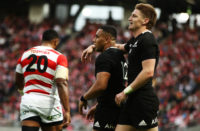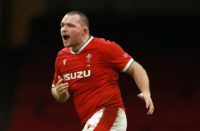 Heavy depressions hanging over Wales in between World Cups are not a new phenomenon even if the latest one may take some lifting. Doom and gloom have showered the country since England counted the ex-champions out on their feet at Twickenham, a victory which would have been all the more decisive but for Dylan Hartley's unwitting heroics in providing Leigh Halfpenny with his fourth, fifth and six penalty goals.
Heavy depressions hanging over Wales in between World Cups are not a new phenomenon even if the latest one may take some lifting. Doom and gloom have showered the country since England counted the ex-champions out on their feet at Twickenham, a victory which would have been all the more decisive but for Dylan Hartley's unwitting heroics in providing Leigh Halfpenny with his fourth, fifth and six penalty goals.
Had England doubled their winning margin, Wales could not have complained. They spent the entire match trussed up in a tactical straitjacket of their own making, either afraid or unwilling to try anything outside the safety first, play-it-by-numbers strategy.
The omens are all too ominious.
Outclassed by Australia before Christmas, outwitted by Ireland in Dublin and outplayed by England, Wales are in danger of being left behind at the highest level.
They do have time to pull themselves out of the slump – a full 18 months before returning to Twickenham for World Cup ties against England in September next year and the Wallabies at the same venue a fortnight later.
Unless they have broken out of their increasingly one-dimensional rut by then, it could be a painfully short tournament.
So much for the worst-case scenario. The last time Wales finished nowhere in the Six Nations, three years ago, they responded in a manner nobody could have envisaged at the time.
The tamest of defeats, to France in Paris in March 2011, condemned Wales to the bottom half of the table. In global terms, it meant absolutely nothing because seven months later, against the same opposition, Wales all but made it to the World Cup final with largely the same team.
No fewer than 13 of those involved in the anti-climactic end to the Six Nations were there on that fateful day at Eden Park when, despite losing their captain, Sam Warburton, to a red card and their scrum anchor, Adam Jones, to an early injury, Wales did everything except win the game.
Then in the third year of his reign as head coach, Warren Gatland had revived a flagging team by introducing more than one new element. Taulepe Faletau, promoted after the Six Nations finished, proved an instant hit in a back row triumvirate who proceeded to take the world by storm.
As a trio, Faleta, Warburton and Danny Lydiate had not been in harness before the friendly against the Barbarians that June. Gatland then decided he could afford to go with one specialist openside, Warburton, and leave his distinguished predecessor, Martyn Williams, at home, marooned on 99 Tests.
Gavin Henson's fractured wrist, during the pre-World Cup match against England that August, proved a blessing in disguise. It gave Jonathan Davies the chance to strike a formidable centre partnership with Jamie Roberts at a time when the rest of the world was still coming to grips with a new force of nature in George North.
While he was defying anyone to stop him on one wing, Wales had the perfect foil on the other in Shane Williams, a priceless combination of brute force and will ‘O the wisp sorcery. What they would give for someone like him now is nobody's business.
Wales are as short of contenders on the wing as they are at full-back. The best of the uncapped, Eli Walker, has been denied his chance because of recurring injury as has his fellow Osprey Hanno Dirksen, the South African who qualifies for international duty next season.
England, ironically, have a young wing straight out of the old-fashioned Welsh mould – Jonny May. Given that it takes a 30-man squad of real quality to win a World Cup, England are already far better equipped in that respect than their western neighbours.
Wales went into the Championship at full strength save for the suspended Ian Evans. England have had to manage without Tom Croft, Alex Corbisiero, Manu Tuilagi, Geoff Parling, Dan Cole and Billy Vunipola.
Whether Gatland can find a way of reinvigorating his team for the next World Cup as he did for the last one remains to be seen.
Right now, England look a better bet, not because they won last weekend but the way they won with their readiness to run from deep and look for space.
Wales, by contrast, played like a platoon of Robocops. They will need to smarten up their game but, as they showed three years ago, that can be done in a matter of months, not that life is likely to get any easier.
With the Springboks next up, Gatland has to decide whether to go for broke in the Tests at Durban and Nelspruit in June or allow some of his more elderly front-line troops a summer's rest.
For players like Adam Jones and Gethin Jenkins, it could make all the difference between appearing at Twickenham in 18 months' time or sitting at home watching it on television.
South Africa would also guaranteee their understudies, be they Rhodri Jones or Samson Lee on one side of the scrum and Paul James on the other, a challenging experience.



























